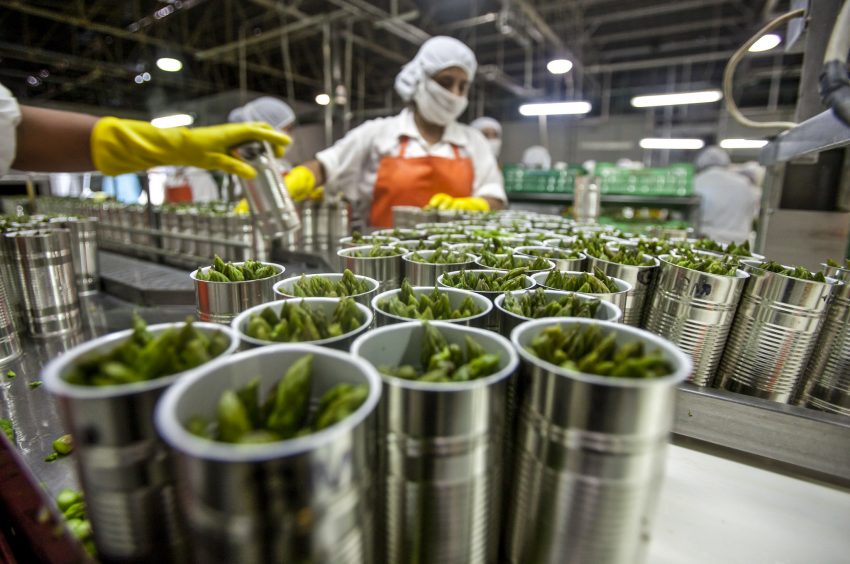Human Health in Relation to the Food Production Industry
The industrial food system has significant implications on public health. Mass food production methods have positives and negatives on each side that we can not overlook. Still, we must better understand how these processes negatively impact our health and well-being on individual and community levels. While food and health do not always go hand in hand, they should, and the only way to make that happen is to change the way we produce our foods on a mass scale. Below, we take a deeper look at how the food production industry is directly impacting the health of the human population.
Genetic Engineering
In the food industry, Genetic engineering is the process of transferring certain traits or genes from one organism to another – most commonly, agricultural products – resulting in Genetically Modified Organisms (GMOs). According to Pew Research Center, more than 90% of corn, soybeans, cotton, and canola grown in the US come from genetically modified seeds. Among the most desirable traits for scientists to alter agricultural products with are herbicide-resistant or glyphosate-tolerant genes. These genes allow agricultural producers to use chemical products to treat their crops without seeing negative impacts on crop health or yields. Herbicides and glyphosate kill plants and other living organisms when applied, destroying flora and creating microbial imbalances in the soil. More importantly, though, these chemical products are detrimental to human and animal health when consumed. The more resistance a crop shows to the chemicals, the more producers use – increasing the risk of human and animal consumption. Among all substances used in modern agriculture, glyphosate is the most biologically disruptive. According to one study, the risk of humans developing certain cancers increases by more than 40% after exposure to glyphosate.
Antibiotics and Hormones in Industrial Farming
Antibiotics and hormones play an essential role in public health and safety when it comes to human health. Unfortunately, we can not say the same thing in regards to the animal food production industry. Industrial farms feed livestock, poultry, and fish antibiotics and hormones to increase growth rates and compensate for the unsanitary, unhealthy conditions in which they raise these animals. More than 80% of antibiotics in the US are fed to industrial farm animals. Up to three-quarters of those same antibiotics are not fully digested – eventually transferring to multiple locations throughout our natural environment. Drug-resistant bacterias result directly from antibiotic use in industrial animal production and reach the public through various channels, including natural resources, human and animal carriers, and food products. According to the CDC, nearly 2.8 million people in the US are hospitalized due to bacterial infections caused by antibiotic-resistant bacteria every year. Another study suggests that long-term exposure to foods raised with antibiotics and growth hormones are causing microbial imbalances in the human gut, negatively impacting long-term human health and bacterial immunity.
Food Additives
Food additives consistently display adverse effects on the human body when consumed regularly. While eating small amounts of foods containing additives may not have negative outcomes, it may be wise to avoid a diet rich in highly processed foods containing various food additives. While not an all-inclusive list, the following industrial food additives commonly show adverse health effects:
- Artificial Food Coloring – Food coloring brightens foods from candy to salmon and makes them look more attractive for consumption. Every year, producers use more than 15 million pounds of dye in US foods. Experts have linked specific food dyes to various allergies, hyperactivity in children, and cancer in recent years. While some challenge these studies, there is enough evidence to suggest avoiding the consumption of certain dyes.
- Monosodium Glutamate (MSG) – MSG is commonly used to enhance the flavors of many savory dishes. While MSG studies show no effect on human brain health, the additive consistently associates itself with weight gain and metabolic syndrome when consumed in large amounts.
- Sugar and Sweeteners – While not surprising, huge amounts of sugars and artificial sweeteners are commonly added to industrial food products. Snack foods, juices, and many other products contain unhealthy amounts of these additives and cause obesity, behavioral changes, diabetes, cavities, and much more.
- High Fructose Corn Syrup – High fructose corn syrup is another common culprit of obesity and adverse health effects in industrial foods, and it’s commonly found in everything from juices to cereals. Heart disease and cancer are also common in people who consume foods with the additive in large quantities. Lastly, empty calories do you no good – especially in foods that already lack healthy nutrients.
- Sodium Nitrite – Sodium nitrite is commonly found in processed meats, acting as a preservative that prevents the growth of bacteria, adding flavor, and keeping red and pink colors from fading. After exposure to high heat, the additive transforms to nitrosamine – another compound with adverse health effects in humans. One study showed an increased risk of stomach cancer in humans when exposed to the compound – making it an intelligent choice to avoid the sodium nitrite additive at all costs.
A Final Word
Mass food production has severe implications on human health. Still, it’s not as easy as pinpointing the causes and making alterations to stop the deterioration of human health on individual and community levels. To make significant positive changes in our health through food production and consumption, we must first find innovative ways to create positive change for consumers and producers, keeping everyone happy in the global food landscape. Government incentives to food producers, harsher caps on production emissions, and higher food quality standards in our communities are all ways we can begin to improve the outlook of human health through food. Changes start on an individual level.


